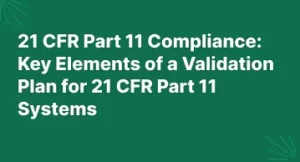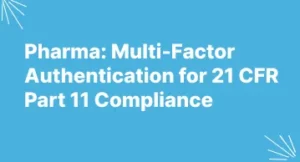Unveiled: A Guide to What is FDA 21 CFR Part 111?
FDA 21 CFR Part 111: An Introduction
The Food and Drug Administration (FDA) created 21 CFR Part 111 in 2007 for the purpose of regulating dietary supplements. The law was created to ensure that dietary supplements are manufactured and sold according to the highest standards of safety and quality.
Part 111 is a comprehensive set of regulations that outlines all aspects of manufacturing and selling dietary supplements, including testing of ingredient safety, record keeping, labeling, delivery and storage requirements, and more.
History of FDA 21 CFR Part 111 Regulations
The Food and Drug Administration’s (FDA) Title 21 Code of Federal Regulations Part 111 (21 CFR Part 111) is a regulation that covers the cGMPs (current Good Manufacturing Practice Requirements) for dietary supplements. It was first written in the early 1990s and revised in 2003 and 2007.
The purpose of Part 111 is to ensure that consumers receive dietary supplements of the highest quality, by establishing manufacturing practices that ensure proper design, monitoring, and control of the manufacturing process, and by requiring finished product testing. The regulation also covers the responsibilities of outsourced partners, including contract manufacturers.
Part 111 is updated regularly as new scientific evidence becomes available, and to support industry best practices. Additionally, the FDA checks that relevant manufacturers adhere to the provisions laid out in Part 111 in order to ensure consumer safety.
Overview of Part 111 Provisions
The FDA 21 CFR Part 111 regulations are comprehensive, detailed set of standards for manufacturing and distribution of dietary supplements. They were established to protect consumers from potentially dangerous products. The standards set forth in Part 111 ensure that products on the market are safe, effective, and accurately labeled.
The regulations cover a wide range of activities, including quality control and safety measures, product development, and recordkeeping practices. Manufacturers and distributors are required to adhere to all Part 111 provisions that apply to their particular product or business. Manufacturers must have good manufacturing processes (GMPs) in place to ensure quality and safety of their products, while distributors must have processes in place to verify the identity and authenticity of products.
Part 111 also establishes requirements regarding labeling and packaging of dietary supplement products, as well as recordkeeping and outsourcing responsibilities. Manufacturers and distributors must comply with these requirements to ensure that the products they sell are safe and meet the standards established by the FDA.
Benefits of adhering to Part 111 Regulations
Meeting the requirements of FDA’s 21 CFR Part 111 is essential for companies wanting to provide safe and effective dietary supplements. FDA 21 CFR Part 111 sets specific guidelines for the manufacture, processing, labeling, and packaging of dietary supplements. By adhering to these regulations, companies can ensure they continue to provide quality products that meet their customers’ expectations.
The benefits of following these regulations can be seen in the consistency of quality of the products being produced. Adherence to these standards also allows companies to show potential customers that they take safety and quality seriously. Additionally, it helps to protect companies from facing costly and/or damaging legal issues due to mislabeled or improperly packaged dietary supplements.
Finally, by complying with Part 111 regulations, companies can be certain that their products are in line with the industry standards. This gives them a competitive edge in the marketplace as customers will have more trust in their products.
Immediate Requirements of FDA 21 CFR Part 111
The FDA Food and Drug Administration has set out guidelines for the manufacturing, packaging, labeling, distribution, and storage of dietary supplements under 21 CFR Part 111. In order to be compliant with these regulations, the immediate requirements must be met.
The FDA requires all facilities that manufacture, package, label, or hold dietary supplements to have a written quality plan. It should include the practices and procedures necessary to ensure that dietary supplements are manufactured in accordance with the current Good Manufacturing Practices (cGMPs). It should also include a list of all ingredients used and their sources, as well as a quality control program.
In addition, the facility must register with the FDA prior to beginning operations, and keep records that document the production of each product. Records must also be kept of any corrective or preventive action taken, as well as the results of any quality control tests.
Part 111 also states that supplements must be analyzed, packaged, labeled, and stored according to cGMPs. Any time a change is made to the supplement, such as an ingredient change or a change to the manufacturing process, the change must be documented and reported to the FDA prior to going into effect.
Quality Control Standards
The FDA 21 CFR Part 111 regulations provide strict quality control standards that must be followed for all dietary supplement manufacturing processes. Quality control standards are intended to ensure the safety and effectiveness of all dietary supplements.
The quality control standards have been designed to identify any potential hazards during the manufacturing process. This includes ensuring that the materials used are of high-quality, that they are safe to use, and that they meet all health and safety guidelines.
Quality control standards also require that the manufacturing process is carried out in a clean and sterile environment. All equipment used must be properly maintained and monitored to ensure that no contamination or mix-ups occur.
Finally, quality control processes involve testing all finished products to make sure they meet all product specifications. Tests should also be conducted periodically to ensure that no changes have occurred during the manufacturing process.
Corrective and Preventative Action Programs
Protecting consumer health and safety is a top priority for FDA 21 CFR Part 111. To achieve this goal, corrective and preventive action programs (CAPA) must be implemented. CAPA procedures allow for the identification of potential issues and the development of efficient solutions. This process begins by identifying all potential sources for product defects or deviations. Common areas where a defect may be identified are in raw materials, packaging, or labeling.
Once a defect has been identified the source of the deviation must also be identified. This includes understanding why the issue occurred and how to prevent it from happening again. After this is done, a corrective and/or preventive action plan can be developed. The plan should include the necessary steps to improve quality and fix the issue at hand.
To ensure that corrective and preventive actions are effective and being followed, they must be monitored and documented. This involves tracking the progress of the corrective action, ensuring that it is being properly implemented, and staying up to date with any changes. A rigorous follow-up process will help maintain the effectiveness of the corrective and prevention action and provide an accurate record of the efforts taken.
Manufacturing Processes
To comply with FDA 21 CFR Part 111 regulations, companies must have a Manufacturing Process in place. This process should include all the steps required to produce safe and effective products including design, development, production, testing, packaging, labeling, and delivery examination.
It’s important to document this process thoroughly, so that a clear picture of all the processes required for producing a product can be seen. This can help ensure consistent quality, while also making it easier to identify any potential issues before they occur. It’s also important to define what types of raw materials are used, as well as any other components needed. This helps to ensure that all products meet the same quality standards.
A good Manufacturing Process should also include provisions for testing and monitoring the quality of the finished product, to ensure it meets all necessary standards. Companies should also document any problems they have encountered during production, so that they can take appropriate corrective action. Finally, companies should also develop a system for following up on customer complaints and feedback. All of these things must be taken into account when establishing a Manufacturing Process to comply with FDA 21 CFR Part 111.
Labeling and Delivery Requirements
FDA 21 CFR Part 111 outlines the labeling and delivery requirements for dietary supplement manufacturers. Labeling should be accurate, truthful, and not misleading, in accordance with Section 4 of the Federal Food, Drug & Cosmetic Act.
Products must clearly display the following information on the label—the product name, the statement of identity, a net quantity of contents, the nutritional content, the name and place of business of the manufacturer, the directions for use, and any warning or caution statements. The ingredients must be listed in descending order of predominance by weight.
Manufacturers must also ensure that the product is delivered in a readily identifiable form with adequate labeling to allow for its proper identification. In addition, each shipment must include a Certificate of Analysis certifying that the specifications are met.
Outsourcing Partnership Requirements
The regulations set out by FDA 21 CFR Part 111 impose certain standards on outsourcing partnerships that must be met. The companies that are partnered with contract manufacturing organizations (CMOs) or external laboratories must conduct qualified audits of these organizations to ensure compliance with the overall FDA 21 CFR Part 111 guidelines.
The company that is responsible for engaging with and managing CMOs and external laboratories must have a written agreement in place that outlines all activities, responsibilities, and expectations for both parties. This agreement must also include a clause that requires that both parties adhere to the applicable CFR Part 111 provisions.
Any change in facility or process should also be reported to the FDA. This includes any change in personnel responsible for activities normally limited to qualified personnel as per Part 111. It also includes changes to the facility or processes used to manufacture, process, package, or hold dietary supplements.
Notifying the FDA of any changes is essential, as it allows them to monitor any discrepancies that may occur due to the nature of the change. Adhering to quality control, corrective and preventative action programs, and proper labeling and delivery requirements are all part of an effective compliance program. Ultimately, these measures create the best possible environment for the safety and efficacy of dietary supplements.
Recordkeeping Requirements
FDA 21 CFR Part 111 places a heavy emphasis on recordkeeping requirements. All operations and processes must be documented, so that if any discrepancies arise companies can show proof of their compliance. Records must include all relevant information such as purchase orders, contracts, invoices, batch records, and labels from the products. All data must be stored electronically and retained for two years.
As part of FDA 21 CFR Part 111, manufacturers must also ensure that they are properly storing all records in an organized manner and that there is a system in place to track and update any changes. Manufacturers must also document any recalls, consumer complaints, rework records, process validation, and shelf life studies.
Furthermore, companies and their sub-contractors should keep a log of all personnel who have access to the records in order to keep track of authorized personnel. It is important to understand and adhere to the recordkeeping requirements in order to maintain compliance with FDA 21 CFR Part 111.
FDA 21 CFR Part 111 is a set of regulations that govern the manufacture, storage, and distribution of dietary supplements. These standards are designed to ensure product safety and consumer trust in the industry. In this guide, we will look at the history of FDA 21 CFR Part 111 regulations, the different provisions, the benefits of adhering to these standards, immediate requirements, quality control standards, corrective and preventative action programs, manufacturing processes, labeling and delivery requirements, outsourcing partnership requirements, and recordkeeping requirements.
The main goal of FDA 21 CFR Part 111 is to promote and protect public health. By ensuring that dietary supplements are manufactured, stored, and distributed according to established safety standards, the FDA is working to create a safe and reliable marketplace for consumers. These regulations strive to make sure that dietary supplements do not cause adverse reactions or adverse health conditions in the general population.
The history of FDA 21 CFR Part 111 dates back to 2007. This was when the FDA released a “Proposed Rule” which established these regulations for manufacturers and distributors of dietary supplements. After considering comments from stakeholders, the Final Rule was released in 2019.
The main provisions of FDA 21 CFR Part 111 require manufacturers to monitor operations closely, operate in compliance with Good Manufacturing Practices (GMP), and check incoming raw materials and ingredients. Manufacturers are also expected to maintain records, put in place a training program, keep equipment and workspace clean, and have a proper system for holding and distributing finished product.
Adhering to FDA 21 CFR Part 111 regulations has numerous benefits. These standards help to ensure product safety and create an atmosphere of trust between manufacturers, distributors, and consumers. Additionally, adhering to these regulations can help to reduce recalls and other associated risks, as well as help manufacturers maintain compliance with other government regulations.
Immediate requirements of FDA 21 CFR Part 111 include the establishment of a quality control system. Manufacturers must develop and implement a standardized system for verifying the identity of each batch of dietary supplements. In addition, they must establish processes for sampling and testing ingredients, monitor storage areas, and inspect packaging and labeling.
Quality control standards outlined by FDA 21 CFR Part 111 require that manufacturers conduct internal audits, document corrective and preventative actions, and check and verify records. Manufacturers must also implement recall procedures and validate methods used to ensure the integrity of products.
Corrective and preventative action programs help to identify areas of potential risks and put processes into place to ensure that any problems are quickly identified and addressed. These programs must be documented and monitored and must include procedures for investigating complaints, maintaining records, and implementing corrective measures.
Manufacturing processes outlined by FDA 21 CFR Part 111 require that dietary supplements are made using appropriate equipment and processes. This includes ensuring that only quality ingredients are used, that storage and packaging is appropriate, and that finished products meet strength, composition, and purity requirements.
Labeling and delivery requirements outlined by Part 111 dictate that labeling must include accurate information including net weight, ingredients, dosage forms, directions for use, and cautionary statements. Additionally, manufacturers must provide appropriate delivery and storage instructions, follow relevant storage and shipping requirements, and notify distributors of any interruptions or changes in production.
Lastly, FDA 21 CFR Part 111 outlines requirements for outsourcing partnerships. Manufacturers must audit their partners and ensure that they are following good manufacturing practices. Additionally, they must document any agreements and confirm that the partner holds the appropriate certificates and licenses.
Recordkeeping requirements outlined by Part 111 require that manufacturers document all processes, including purchasing, storage, and production. Documentation of corrective and preventative actions, customer complaints, and recall activities are also required.
In summary, FDA 21 CFR Part 111 regulations offer a set of standards to help ensure product safety and consumer trust in the dietary supplement industry. These regulations govern the manufacture, storage, and distribution of dietary supplements and mandate quality control standards, corrective and preventative action programs, manufacturing processes, labeling and delivery requirements, outsourcing partnerships, and recordkeeping requirements. By adhering to these standards, manufacturers and distributors are able to maintain a safe and reliable marketplace for dietary supplement consumers.
Frequently Asked Questions about FDA 21 CFR Part 111
1. What is FDA 21 CFR Part 111?
FDA 21 CFR Part 111 is a regulation set by the Food and Drug Administration (FDA) that outlines what standards the dietary supplement industry must comply with to ensure the safety and quality of their products.
2. What is the history of FDA 21 CFR Part 111 regulations?
FDA 21 CFR Part 111 regulations were first enacted in 2003 after several government reports revealed serious deficiencies in the manufacturing processes of dietary supplement companies, leading the FDA to develop consistent regulatory oversight across all facilities.
3. What are the provisions of Part 111?
The provisions of Part 111 include requirements for quality control programs, corrective and preventive actions programs, manufacturing processes, labeling and delivery requirements, outsourcing partnership requirements, and recordkeeping requirements.
4. What are the benefits of adhering to Part 111 regulations?
Adhering to Part 111 regulations provides companies with standardization of production practices and a streamlined approach to quality control and record keeping while also ensuring that dietary supplement products meet the appropriate safety and accuracy standards.
5. What are the immediate requirements of Part 111?
Immediate requirements of Part 111 include ensuring all dietary supplements are manufactured according to Good Manufacturing Practices (GMPs), that they are accurately labeled, and that records of production and testing activities are kept for all products.
6. What are the quality control standards?
Quality Control standards within Part 111 require companies to develop and implement a system of checks and balances to identify, document, and prevent or correct any issues with products that do not meet the criteria of safety and quality established in the regulation.
7. What are the Corrective and Preventative Action programs?
The Corrective and Preventative Action (CAPA) programs within Part 111 require companies to create documented plans for how to address and prevent any deviations from the established safety and quality regulations.





